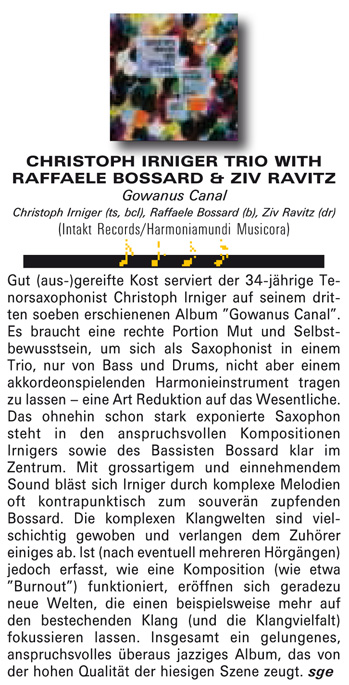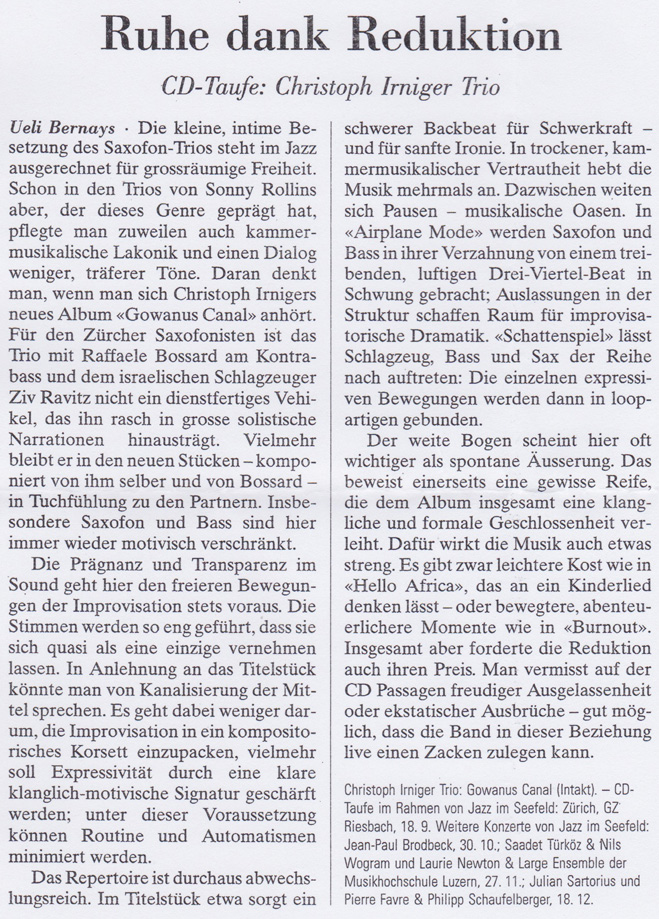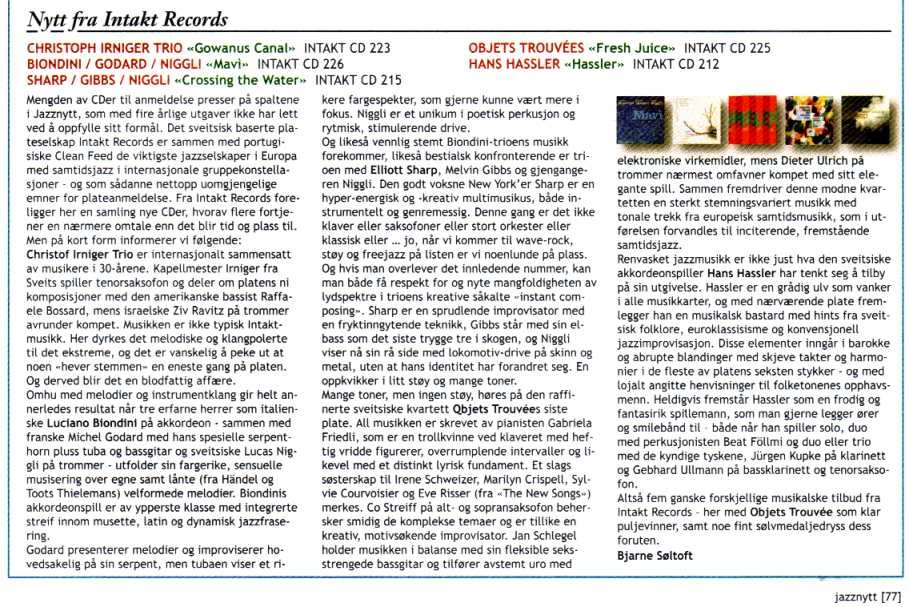INTAKT RECORDS – CD-REVIEWS
CHRISTOPH IRNIGER TRIO
GOWANUS CANAL
Intakt CD 223
Thermoskanne
Ulrich Steinmetzger, Leipziger Volkszeitung, 20./21. Juli 2013
Der Leader des CHRISTOPH IRNIGER TRIOs zeigt sich mit Gowanus Canal (Intakt CD 223) so ... so anders, dass man ihm sein Doppelleben als Cowboy From Hell fast nicht glauben kann. Das Titelstück legt als seltsam verschleppter Blues den Akzent gleich zu Beginn auf Feeling und stellt sich taub gegen jedes Ansinnen, das zu ändern. Mit markantem Geklacke macht da auch schon der israelische Drummer Ziv Ravitz auf sich aufmerksam, um bei 'Airplane Mode' danach mit flottem Tickling für Tempo zu sorgen. Dritter Mann ist der samtpfotige Bassist Raffaele Bossard, der, nicht zu verwechseln mit Irnigers Mitcowboy Chrigel Bosshard, eigene Klangproben abgegeben hat mit etwa Junction Box, in Gregor Frei Asmin und Dominic Egli's Plurism. Er hilft mit seinem pelzigen Getatze auch die Schatten in seiner zarten Eigenkreation 'Schattenspiel' auszumalen, wo sich Irniger so überzeugend als inniger Schmuser und Träumer erweist, als hätte er nie sein Horn höllisch elektrifiziert (was ich bisher für sein Markenzeichen hielt). Man nimmt ihm jedoch, ob bei 'Hello Africa' oder wieder Bossards 'Black Pearl' und 'Kanon', gern seine gedämpften Gesänge ab. Wie kann etwas so Cooles, das er auf der Zunge schmelzen lässt, nur so warm klingen? Selbst wenn ihm die Stimme bricht wie mitten in 'Black Pearl', wirkt Irnigers Summen nicht expressiv, sondern nach innen gekehrt. Nach 'Kanon' als dem bloßen Schatten einer allertraurigsten Melodie servieren 'Burnout' und 'The Slope, Pt. 1' ihre Melancholie mit einem leisen Lächeln. Als wollte dieser Blackbird es auf keinen Fall zu bunt treiben, weil ihm Schwarz nun mal am besten steht. Auch 'M' legt zuletzt seinen feinen Schattenschleier nicht ab. Warum auch. Trübseligkeit und Melodienseligkeit sind hier, aller Etymologie zum Trotz, Zwillinge.
Marc Chénard, La Scena Musicale, August 28, 2013 (english) Marc Chénard, La Scena Musicale, August 28, 2013 (french)
SPENNENDE FRA UKJENTE STEMMER Man skal være langt over gjennomsnittet interessert i det som skjer i mellom-europeisk jazz for å ha inngående kunnskap om karriera til den knapt 35 år gamle tenorsaksofonisten og bassklarinettisten Christoph Irniger. Etter å ha studert i hjembyen Zürich, gikk turen til både Berlin og New York – to metropoler egna for å utvide horisonten.
Nicole Isele, Züriberg, 12. September 2013, Schweiz
Tom Gsteiger, Aargauer Zeitung, 16. September 2013
The trio recorded this studio date in nascent saxophonist Christoph Irniger's (Pilgrim and Cowboys from Hell, NoReduce) hometown of Zurich, Switzerland. However, the band was formed in New York as the respective artists are true jazz warriors, aligning their wares with various groups and sessions. Israeli drummer Ziv Ravitz and Los Angeles-based bassist Raffaele Bossard help elevate this outing into an atypical sphere by injecting unanticipated surprises that also equates to a highly democratic approach to the jazz trio concept. Disparate tonalities and a largely, measured gait loom as the trio's hallmark. Irniger often takes his time from a thematic development standpoint and focuses on delivering animated storylines. With moody passages, splintered progressions and subtle hues, the musicians do render some unexpected breakouts. For example, Ravitz unleashes unwieldy patterns during the opener "Gowanus Canal," where the band alternates fractured flows with moments of temperance and a few false endings. Indeed, it's a cunning piece; however, they bump it up on "Airplane Mode" via a crisp and oscillating sequence of outbreaks, enlivened by shifting dynamics. Moreover, Irniger's soft sax lines transform into several choruses of fluidly exercised runs within the scope of a rather modest primary melody. The artists switch between contemplative plot formation and linear trajectories along with their propensity for generating pliant rhythmic episodes. The music breathes as either Irniger or Bossard's compositions are chock full of sentiment and warmth amid a surprising amount of stark dissimilarities. They can be poignant or intertwine buoyancy into the schema. For example, "Black Pearl" is a piece that starts with rumbling drums but diminishes into a near whisper during the bridge, paralleling notions of lament, yet the rhythm section picks up the pieces and launch an off-kilter Afro-Cuban vamp leading to the finale. Nonetheless, the program is a study in transversely opposed contrasts, supplementing a set built on dense compositional outlines, marked by the musicians' persuasive interactions and razor-sharp focus. There's a lot going on under the covers, to say the least.
Dalla quasi imprescindibile fucina di Zurigo (almeno trattando di jazz all'elvetica) si fa avanti un giovale leone dello strumento ricurvo e già troppo denso di lignaggio: particolarmente il sassofono non manca di maestri e modelli e, secondo riferimenti oggi di comodo (non per questo da avallare, e con tutto il possibile tributo non soltanto per i Parker, Adderley, Hawkins ma certamente eccetera fino agli attuali), nel valutare gli influssi del tale nuovo esponente alle attenzioni critiche, il dilemma spesso si gioca più sulle assonanze rispetto a Coltrane o piuttosto Rollins, storicamente riuniti sui solchi di Tenor Madness ma di fatto distinti già allora per temperamento e approccio, e tali mantenutisi nelle conseguenze stilistiche fino ad oggi.
Valeur montante d'une scène suisse alémanique en constante agitation, le saxophoniste Christoph Irniger a étudié, comme tant d'autres à Lucerne, la petite Chicago du lac des Quatre-cantons, avant de s'installer aux États-Unis, où il multiplie les collaborations, de Nils Wogram à Stephan Rusconi. Remarqué en 2007 avec Chat Noir, où il mêlait son anguleux ténor à un groove électrique foisonnant, on retrouve aujourd'hui sa musique dans une version en trio, plus dépouillée mais tout aussi urbaine. Deux autres trentenaires européens, eux aussi installés à New York, forment la base rythmique entreprenante et très musicale d'une relation à trois circulaire et génératrice de mouvement. Pas de leader ici, bien que le saxophoniste signe la plupart des titres. Erniger favorise en revanche une prise de responsabilité commune, basée à la fois sur la clarté mélodique et la fluidité d'une polyrythmie colorée, à l'image de la pochette et de sa palette tachiste. Chaque morceau est donc une couleur, souvent vive (« Hello Africa »), définie tour à tour par chacun des membres. Par exemple, lorsque le jeu sec et profond du contrebassiste Raffaele Bossard se charge des pigments (« Kanon » qu'il a d'ailleurs écrit), une teinte sombre et profonde s'empare du trio, reprise par le timbre velouté de la clarinette basse. Le Gowanus Canal traverse Brooklyn, comme ce trio qui s'inscrit durablement dans une esthétique tout droit sortie des clubs new-yorkais. Le batteur israëlien Ziv Ravitz, habitué aux triangles musculeux de Shai Maestro ou aux formations de Yaron Herman, trouve en Bossard un complice idéal pour évoquer un courant vraiment très continu... Dans un morceau central comme « Black Pearl », le plus long de cet album ramassé, l'axe puissant formé par la rythmique semble charrier un ténor dont la parole parcimonieuse et sereine laisse éclater la musicalité de ses comparses. Une efficacité évidente pour un premier album qui laisse augurer un avenir intéressant.
Der Schweizer Saxofonist Irniger hat sich für Gowanus Canal mit jungen und hungrigen Kollegen seiner Generation zusammengetan. Die Rhythmusgruppe Bossard (wichtig ist sein eigenes Projekt Junction Box) & Ravitz (Lee Konitz, Yaron Herman Group) machen dabei wirklich gute Arbeit. Reaktionsschnell und stets zur richtigen Zeit am richtigen Ort. Und, das ist schön, es muss nicht immer die Hardcoresection dominieren, es dürfen auch, ohne ins Triviale oder Banale zu verfallen, melodiöse Songs gespielt werden. Stücke, bei denen man beim ersten Hören schon meint, sie schon lange zu kennen. Vielleicht ist das der Beginn des ‚Schweizer Songbooks‘, eine Aufforderung für andere Bands, diese in sich ruhenden, funkelnden Miniaturen auch ins Repertoire aufzunehmen. Man muss sie ja nicht notengleich kopieren. Dieser mit schönem Ton, vornehmer Reduktion und eleganter Verve vorliegende Tonträger erinnert mich an einen Klassiker dieses Genres, eine Einspielung aus dem Jahre 1974 des Enja-Labels (2046), Bobby Jones: Hill Country Suite. Möge auch Gowanus Canal die Jahrzehnte so frisch und munter überstehen!
Franziska Buhre, TAZ, Deutschland, 29. Nov. 2013
Luftschlösser auf ruhigem Fundament Am Sonntag spielte das Christoph Irniger Trio aus der Schweiz in der Reihe Jazzcafé im Rind. Wobei, das "echte" Christoph Irniger Trio war es dann doch nicht. Dem Saxofonisten war nämlich kurzfristig seine Rhythmusgruppe ausgefallen.
Schu, Concerto, Österreich, Dezember 2013
Der Saxofonist als Schattenspieler
Bjarne Soltoft, Jazznytt, Oslo, No, 4-2013
Le saxophoniste Christoph Irniger s'inscrit ici, et même s'enracine, dans la déjà longue tradition du trio sax-basse-batterie, sans piano. Les thèmes et les improvisations sont imbriqués, l'accompagnement est très libre, et le jeu du saxophoniste semble très réfléchi : pas de précipitation ni de d'effets, ni de coups d'éclat dans cette musique moins simple qu'il n'y paraît et qui doit s'apprécier, sinon se déguster. Jean Buzelin, Culturejazz France. 14 janvier 2014
Frank von Niederhäusern, Kulturtipp, Schweiz, Februar 2014
David Cristol, Improjazz, France, Mars 2014
From Swiss saxophonist Christoph Irniger, in the company of Raffaele Bossard on bass and Ziv Ravitz on drums, we get some highly unusual music. True, it's not free jazz, but a mixture between jazz and folk and with maybe classical influences, but this is music as joyful as you can imagine it, with all three instruments often conversing at breakneck speed while delivering beautiful little dances. But not all dances are fast and hectic, they can be slow and moving too, as on "Kanon" or "M". Beautiful and refreshing.
Per essere una formazione senza strumenti armonici, il trio del sassofonista svizzero Christoph Irniger sembra dare un'importanza capitale all'armonia nella sua accezione più stretta, tonale. Questo non significa che il gruppo pensi, componga e suoni in modo troppo tradizionale. A fugare il sospetto bastano i primi secondi della prima traccia, che dà il titolo a questo Gowanus Canal, terzo disco ad uscire a nome di Irniger. Quello che ha tutti i crismi di uno slow blues (lancio di batteria compreso) va in frantumi dopo due battute e mezza. Meglio: l'armonia del blues rimane, ma Irniger e soci si inseguono in un caleidoscopio di frammentazioni e subitanee riprese del tempo. La serie delle composizioni, suddivisa tra la penna di Irniger e quella di Raffaele Bossard, alterna brani dal tono grave e meditativo a cavalcate frenetiche, vagamente afro, quasi senza via di mezzo. E in generale tutto il disco è attraversato da una certa cupezza timbrica, data dall'impasto dei tre strumenti che, in questo senso, formano un'amalgama compatta: il suono soffiato e scuro di Irniger, che ricorda qualcosa di Warne Marsh, la cavata potente di Raffaele Bossard, la scelta di un'accordatura molto bassa, da timpani, dei tamburi di Ziv Ravitz. Il ruolo del contrabbasso oscilla tra quello di uno strumento di contrappunto (come nei classici trii pianoless) e quello, predominante, di vero e proprio ancoraggio armonico, con accordi e arpeggi: di qui l'impressione che l'armonia sia sempre il centro del pensiero musicale del gruppo, anche nelle composizioni apparentemente più astratte, come "Hello Africa" e "The Slope (pt. 1)." C'è, infine, un elemento che impedisce alle esecuzioni del trio di decollare in tutta la loro potenza: il fatto che Irniger, quando improvvisa, si attiene ad un rigido schema ritmico (le quartine, quasi sempre), come non avesse il coraggio di staccarsene e variare. Ciò accade soprattutto nei fast e dà un senso di scolasticità: non fastidioso, ma avvertibile. Quando il sassofonista riesce, ad esempio in "The Slope (pt. 1)," a riscattarsi da questa sorta di autocostrizione, il risultato, in termini di libertà ed efficacia espressiva, è decisamente più convincente. Luca Casarotti, All About Jazz Italia. 18/03/2014
Christian Laréde, Jazz News, France 2014
Kayo Fushia, Jazztokyo, Nov 2014
|


















